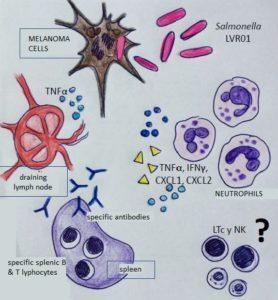Melanoma is the less frequent but the most severe form of skin cancer, with increasing incidence worldwide. It can be easily cured at early stages, when it metastasizes therapeutic options are not effective. Since the discovery of the Coley toxin in the 19th century, bacterial based immunotherapies have been evaluated for the treatment of cancer. In this regard, Salmonella enterica serovar Typhimurium has shown great potential as an antitumor immunotherapy due to its capacity to accumulate in tumors, intrinsic antitumor activity and ability to trigger an immune response in the tumor microenvironment.
Imiquimod is a toll-like receptor (TLR)-7 agonist with a potent antitumor activity mediated by plasmocytoid dendritic cells (pDC). Although it has been approved by the FDA for the use on basocellular carcinomas, its use in melanoma is still controversial. In this work, we assessed the potential of a combined immunotherapy including the use of both Salmonella and imiquimod for melanoma. The approach consists on stimulating various TLRs so as to potentiate antitumor innate immunity. B16F1 melanoma-bearing mice were daily treated with topical imiquimod in combination with one intra-tumoral injection of attenuated Salmonella enterica serovar Typhimurium LVR01.
Our results indicate that the combined immunotherapy induces an antitumor immune response that prolongs the survival of melanoma-bearing mice and reduces occurrence of distant metastases. This is due to an enhancement in the expression of pro-inflammatory cytokines and chemokines in the tumor microenvironment, with a Th1-skewed profile, as well as the infiltration of cytotoxic T lymphocytes and neutrophils. In addition there was a systemic specific antitumor response, characterized by splenic B- and T-cell proliferative responses. All this resulted in a broad antitumor response, which overcame the melanoma-mediated immunosuppressive status. We strongly believe that this inexpensive immunotherapy is suitable and close to clinical application.
Journal Article: Vola et al., 2018. TLR7 agonist in combination with Salmonella as an effective melanoma immunotherapy. Immunotherapy
Article by Amy Mónaco











